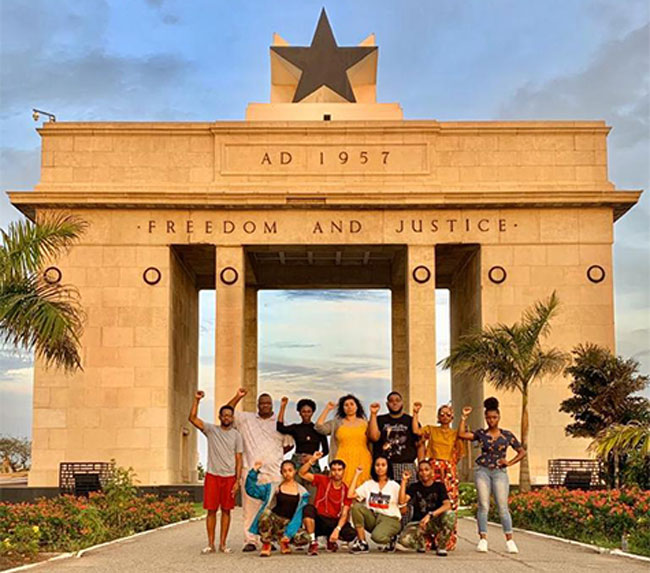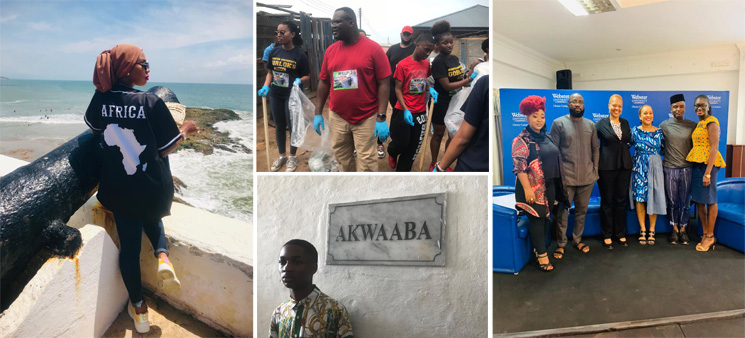Africana Studies Scholars Return from Ghana Campus
November 04, 2019
A cohort of nine students of color at the main campus in St. Louis just returned from a week-long, immersive, experience in Ghana, where Webster University has a campus in the capital city of Accra. The trip was part of a semester-length Introduction to Africana Studies experiential learning course.
The students, led by Emmanuel Balogun, assistant professor of International Relations and co-director of Global M.A. International Relations program, experienced the social, political, and economic linkages and connections of life in Africa and the African Diaspora. The group also included Corey Hawkins of the Academic Resource Center, and Vincent Flewellen, chief diversity officer of Webster University, main campus.
Welcome to Ghana!

The Webster University cohort at the Black Star Gate in Accra's
Independence Square.
The packed itinerary assured a full Ghanaian experience, taking the group across three of Ghana’s sixteen regions and to historical sites of importance.
Starting at the Ghana Campus where they were warmly welcomed by Campus Director, Christa Sanders, staff and administration, in an orientation; the students then took to the streets of Accra, visiting the famed Kwame Nkrumah Mausoleum (the resting place of Ghana’s first president), the bustling Central Market to buy traditional Ghanaian fabrics and experience the vibrancy of Accra, visited the African American Ancestral Wall, and enjoyed a buffet feast of cuisine representing all of Ghana’s ethnic groups.
The group was also welcomed to Ghana by Gail Nikoi, president of the African American Association of Ghana and hosted to a lecture on "Ghanaian Society and Culture" by a professor from the Institute of African Studies at the University of Ghana.
From Accra, the group traveled to Kumasi in Asante Region to experience traditional governance and culture of Ghana. This included a visit to the royal Manhyia Palace, sitting place of the Asante Kingdom, and the Ntonso Adinkra Village where they stamped Adinkra symbols onto cloth, which represent particular proverbs, departing messages, and aspirations rooted in the Akan tradition.
A "Transformative" Experience
Perhaps the most transformative portion of the trip occurred in the Central region. The group had the opportunity to experience the Assin Manso Slave River – the last reported bathing place of Africans who were captured for enslavement before they were sold into captivity. The group intimately connected to the experiences of their ancestors and walked barefoot through the woods and paid homage and respects by standing in the river. From there, the group experienced the Cape Coast and Elmina castles, the oldest and largest slave dungeon in the world, while Cape Coast was built during the height of the Transatlantic Slave Trade.
Here, the group learned the depths of the inhumanity of the slave trade and were able to stand in the same dungeons where four hundred years ago, ancestors of many African American and Caribbean people of the African Diaspora were forced to board ships through the "Door of No Return" to a life of enslavement in the Americas.

Finding Commonalities
Back in the Greater Accra region, the students were able to meet with Webster Ghana students and engage in an energetic group discussion of the film "Bound: African vs African Americans", a film that reflects on the experiences and perceptions Africans and African Americans have of each other. The discussion was followed by a fun social with all students and staff. They furthermore attended Webster Ghana’s 16th Public Lecture on Social Media in the 21st Century, featuring visiting faculty Kathleen Walls (U.S.) and resident professor Kobina Ankomah-Graham as panelists, dissecting the global impact on mental health, business solutions and social movements.
The experience rounded out with an exploration of Ghana’s political development. The group received a tour of the Kofi Annan International Peacekeeping Training Centre and had the privilege of sitting in on a number of trial sessions at the Supreme Court of Ghana. Two of the most memorable experiences in the capital, included an opportunity to enter the gorgeous Jubilee House (Office of Ghana’s President, Nana Dankwa Akufo-Addo) and a community service day in the community of Chokor, Jamestown.
The group met the Diaspora Affairs Division at the Office of the President, where they learned more about Ghana’s engagement with the global diaspora community and more about the ‘Year of Return’. A beach cleanup with BASICS International on the final day was a moving experience for all as students, staff and faculty; cleaning up plastic waste and interacting with the local community.
An Unforgettable Experience
Overall, the group was struck by the level of hospitality they experienced throughout their entire stay in the country, encouraged now to be more intentional in reaching out to African students back at the home campus.
“The trip to Ghana was in fact far more than a trip to me," said Millenia Wells, a sophomore majoring in Biological Sciences with an emphasis in Health and Medicine. "It was an experience of emotional and self-reflecting empowerment in which allowed me to get a glimpse of history and culture that was once stolen from my people long ago."
The group reflected on commonalities between Ghanaian culture and African American culture which provided a feeling of belonging and being at home. More importantly, the group expressed the need to come back to the U.S. and center their experiences in places where they have been excluded. One of the greatest takeaways was the need for more conversations, engagement and connections between African Americans and those who recently emigrated from countries in Africa to the U.S. Webster Ghana was proud to have diversity training sessions for both students and staff led by Flewellen and host the group at the Webster Ghana Campus.
